Internet tracking has become a prevalent concern for individuals seeking to protect their online privacy in this digital age. As we all know, many websites on the internet usually collect vast amounts of data about users' online activities, often without their knowledge or consent. This data can be used for targeted advertising, profiling, and even surveillance.
To safeguard your privacy and prevent internet tracking, it is crucial to implement effective strategies and tools. In this guide, we will explore ten proven methods to protect yourself against internet tracking and enhance your online privacy.
Part 1: What Is Internet Tracking?
Internet tracking refers to the collection and analysis of data about an individual's online activities. Various entities, including websites, advertisers, and government agencies, track users' browsing habits, interactions, and personal information. This tracking enables the creation of detailed user profiles, which can be used for targeted advertising, content personalization, and other data analysis.
Part 2: How Does Internet Tracking Work?
Tracking methods can provide information about individual user behavior. One common method is tracking cookies. These are small data packages that store individual data on a user’s computer or smartphone when visiting a website. Cookies can be read automatically when the website is visited again. There are first-party cookies, which are specific to the website being visited, and third-party cookies, which can track users across multiple websites.
Another tracking method is the use of tracking pixels. These are small pieces of code embedded into a website, often from services like Facebook or Google Analytics. When a visitor performs a specific action, such as scrolling, the pixel collects data and sends it to the service. More tracking methods are explained below:
- Fingerprinting: It creates a unique digital fingerprint of the user based on device and browser information. This method uses software and hardware characteristics, like operating system and browser settings, to track users. The information is transmitted to the website’s server when the website is accessed.
- IP address: It is a network address used to identify devices on the internet. However, it can be challenging to identify individual users when multiple users share the same internet connection or use VPN encryption. IP addresses can provide relative location data but not precise location information.
- Email tracking: It tracks email interactions, such as opens and clicks. It allows senders to determine the opening and click rates and optimize their email campaigns.
- App tracking: It tracks users’ behavior within apps and collects information about users. This tracking can involve accessing data like photos and location. Sensitive data may be transmitted to the app operator’s servers.
What kinds of data can be tracked?
Tracking on the internet can gather a wide range of information. In addition to a user’s activity on a website, personal data like the IP address can also be recorded. Here are some examples of the data that can be tracked:
- Visited websites
- Specific pages within a website
- Duration of time spent on each page
- Referring website that led to the current website
- Clicked elements (links, buttons, etc.)
- Viewed and purchased products
- Device and browser information
- Downloaded files
- Mouse or eye movements on the website
These are just a few examples, as there are many other types of data that can be collected through tracking technologies.
Part 3: Advantages & Disadvantages of Internet Tracking
While internet tracking can offer benefits such as personalized recommendations and targeted advertising, it also raises significant privacy concerns. Read on to find out the advantages and disadvantages of internet tracking below;
Advantages of Internet Tracking
- Personalized Content: Internet tracking allows websites to gather data about your preferences and behavior. This data can be used to personalize your online experience by showing you content, products, or ads that are more relevant to your interests.
- Improved User Experience: Tracking can help websites remember your login details, settings, and browsing history, making it more convenient for you to navigate and use various online services.
- Targeted Advertising: Advertisers can use tracking data to deliver more relevant ads to you. This can reduce the number of irrelevant ads you see and potentially provide you with offers that align with your interests.
- Website Optimization: Website owners can use tracking to analyze user behavior and make improvements to their site's design, functionality, and content, leading to a better user experience.
- Security and Fraud Prevention: Tracking can help identify and prevent fraudulent activities, such as account hijacking or unauthorized access, by monitoring unusual behavior patterns.
Disadvantages of Internet Tracking
- Privacy Concerns: One of the most significant disadvantages is the erosion of privacy. Tracking can collect a vast amount of personal information without users' consent, leading to concerns about data security and misuse.
- Data Breaches: The collected data can become a target for hackers and cybercriminals, potentially leading to data breaches and identity theft.
- Invasive Ads: While targeted ads can be useful, they can also feel invasive, as users may feel like their every move online is being monitored for the purpose of advertising.
- Filter Bubbles: Personalized content can create filter bubbles where users are only exposed to information and viewpoints that align with their existing beliefs, limiting exposure to diverse perspectives.
- Limited Control: Users may have limited control over what data is collected and how it's used, leading to a feeling of powerlessness over their own online data.
Part 4: Ultimate Solution To Prevent Internet Tracking On Mac
One effective tool to prevent internet tracking is an advanced privacy protector like Macube Cleaner. This software offers comprehensive privacy protection by removing tracking cookies, clearing browsing history, and blocking unwanted tracking scripts.
Moreover, Macube Cleaner is nor limited to just preventing internet tracking, it offers other features like file shredder, duplicate file finder, large & old files finder, etc., that allows you to keep your Mac clutter-free from unwanted apps, photos, videos,messages data, iTunes data, and lots more.
Key Features
- Easily protect your online privacy by clearing browser history and cookies.
- Completely remove duplicate files, video, photos, message, etc., within a few clicks.
- Uninstall unneeded apps without any leftovers, such as malicious and stubborn software that always harasses you.
- Erase junks and other files cluttering your Mac storage with one click.
Step 1: Start the Macube Cleaner. Then, choose the “Privacy” feature from the left side and click on the “Scan” button that appears.
![]()
Step 2: The tool will scan your Mac browsers deeply for any sensitive data like cache files, cookies, and downloads that can cause unknown parties to track your activities.
![]()
Step 3: After the above process is complete, select the browsers you want to erase data from and check the relevant checkboxes. Then click “Clean”.
The app should clean your browsing data without leaving any traces within a few seconds to minutes.
Part 5: 9 Other Ways to Effectively Prevent Internet Tracking On Any Device
The above technique will enable you to prevent internet tracking on Mac computers running macOS 10.10 or later. But if you wish to learn how to prevent internet tracking on your other devices, read on to find out more.
Way 1: Adjust Privacy Settings Across Your Devices
Take the time to review and adjust privacy settings on all your devices, including smartphones, tablets, and computers. Disable unnecessary permissions and restrict access to location data, camera, and microphone. Also, regularly updating your operating system and applications ensures you have the latest security patches and privacy enhancements.
Way 2: Disable Cookie Tracking on Websites
Most websites use cookies to track user behavior and personalize content. However, you can disable cookie tracking in your browser settings or use browser extensions that block or manage cookies. This prevents websites from storing and accessing your browsing history and preferences.
Here is how to disable cookie tracking on different devices browsers;
Safari
For Mac
Step 1: Launch “Safari” on your Mac.
Step 2: Navigate to the top-left corner and click on “Safari”. Then, select “Preferences” from the drop-down.
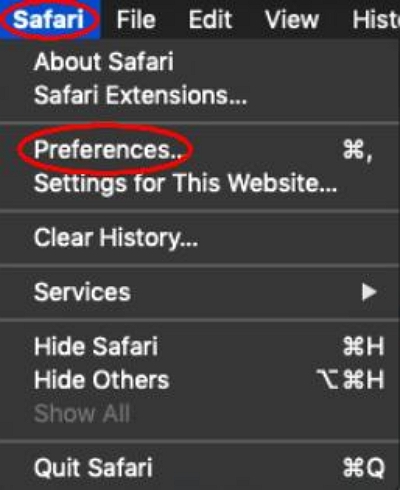
Step 3: Click the “Privacy” tab and tick the checkbox next to “Block All Cookies”.

Restart Safari after you complete the steps above.
For iPhone
Step 1: Go to the “Settings App” on iPhone.
Step 2: Scroll down and tap on “Safari”.
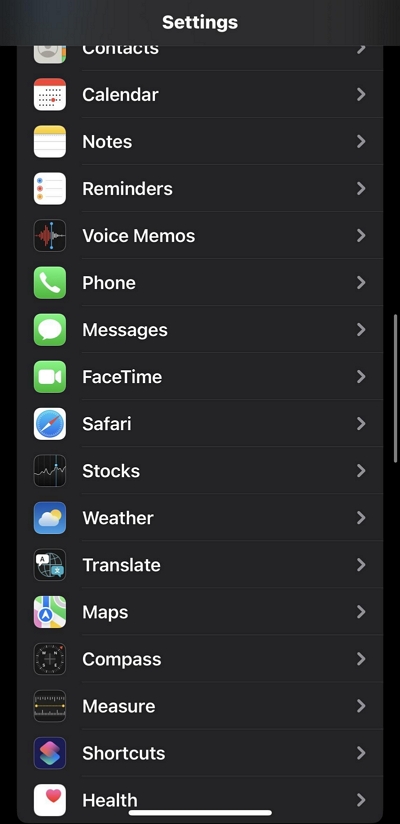
Step 3: Scroll down and toggle on “Block All Cookies”.
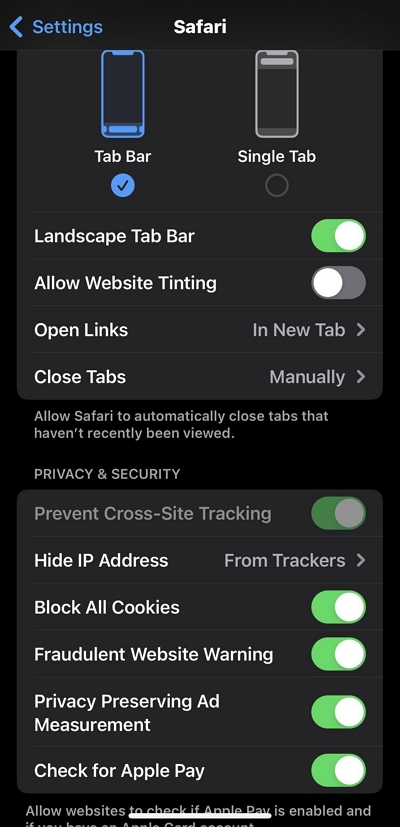
Chrome
For Computer (Windows/Mac)
Step 1: Open Google Chrome and tap the “Three-dot” vertical icon at the top-right corner and select “Settings” from the drop-down menu.
Step 2: Select the “Privacy and Security” tab from the left hand side. Then, click on “Cookies and other data”.
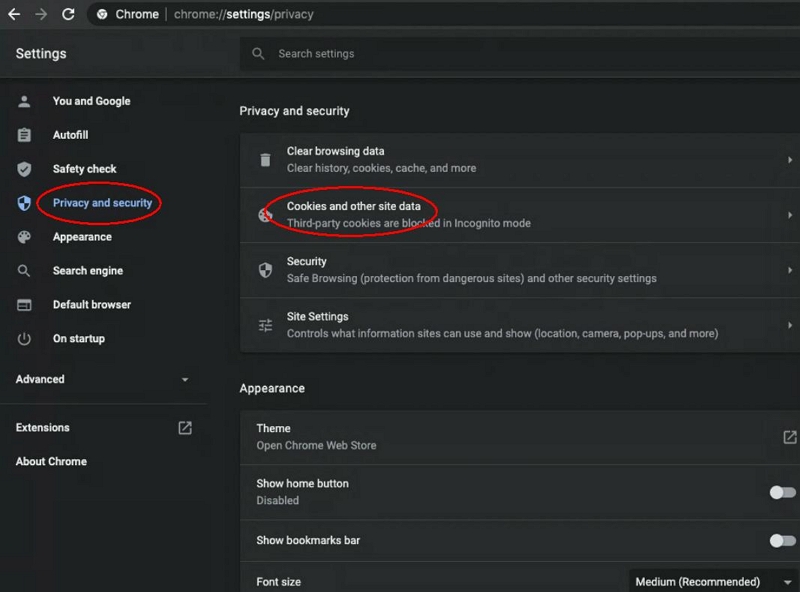
Step 3: On the new page, select “Block Third-Party Cookies” to disable all cookie tracking websites.
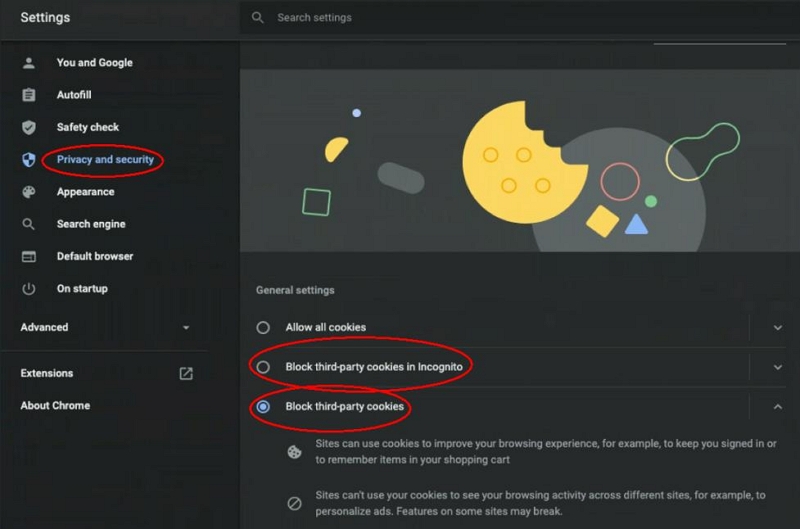
For Android
Step 1: Open the “Chrome App” on your Android and tap the “Three-dots” vertical icon at the top-right corner.
Step 2: Select “Settings” from the menu list.
Step 3: Tap on “Site Settings” and select “Cookies”.
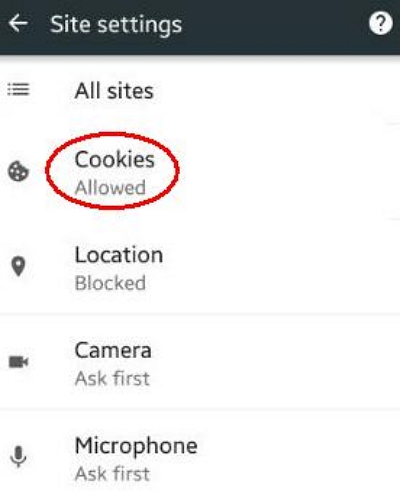
Step 4: Select “Block All Cookies” to disable third-party tracking websites.
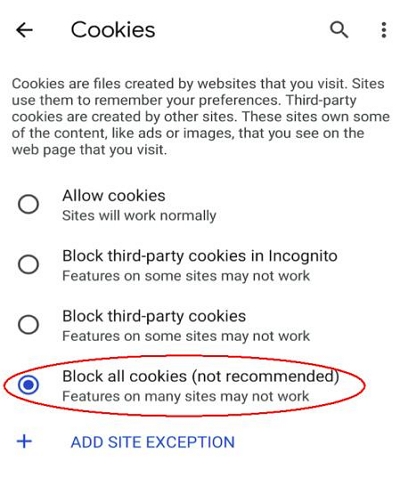
Way 3: Enable "Do Not Track"
Enable the "Do Not Track" feature in your browser settings. This sends a signal to websites and advertisers, requesting them not to track your online activities. While not all websites honor this request, it can still provide some level of protection against tracking.
Safari
Unfortunately, Safari no longer supports the “Do Not Track” feature. However, you can enable “Prevent Cross-site tracking” to prevent third-party content websites from tracking you.
For Mac
Step 1: Open “Safari” app on your Mac.
Step 2: Click on “Safari” from the top-left corner and select “Preferences” from the drop-down menu.
![]()
Step 3: Click on the “Privacy” tab and check the checkbox next to “Prevent Cross-Site Tracking”.
For iPhone
You can also enable “Prevent Cross-Site Tracking” on your iPhone. But it's via the settings app.
Step 1: Open the “Settings” app on iPhone. Then, scroll down and select “Safari”.
![]()
Step 2: Scroll down to “Privacy and Security” section and toggle on “Prevent Cross-Site Tracking”.
![]()
Chrome
Unlike Safari, Google Chrome supports the “Do Not Track” feature. See how to enable it on your computer and Android phone below;
For Computer
Step 1: Open “Google Chrome” and click the “three dots” on the top-right corner to open the “Main Menu”.
Step 2: Select “Settings”.
Step 3: On the “Settings Page”, scroll down and select “Advanced”.
Step 4: Navigate to “Privacy and Security” section. Then, Enable the “Send a "Do Not Track request with your browsing traffic” option.
For Android
Step 1: Launch “Google Chrome” on your Android device.
Step 2: Go to “Menu” and select “Settings”.
Step 3: Tap on “Privacy and Security”.
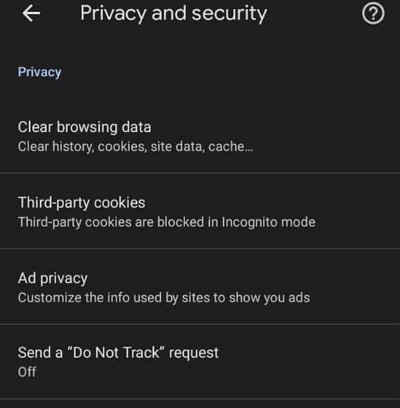
Step 4: On the “Privacy and Security” page, tap on “Send A Do Not Track Request” and toggle it on to enable it.
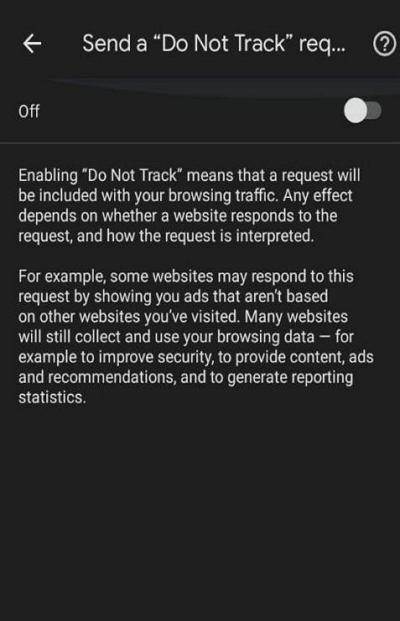
Way 4: Use an Ad Blocker
Install an ad blocker extension on your browser to block intrusive ads and prevent tracking scripts from running. Ad blockers not only improve your browsing experience by removing annoying ads but also protect your privacy by blocking tracking attempts.
Way 5: Browse via Incognito Mode
Use your browser's incognito or private browsing mode when you want to browse the internet without leaving a trace. Incognito mode prevents your browsing history, cookies, and other data from being saved on your device. However, note that it does not provide complete anonymity or protection against all forms of tracking.
![]()
Way 6: Use a Private Search Engine
Switch to a private search engine like DuckDuckGo or StartPage that does not track your search queries or store your personal information. These search engines prioritize user privacy and deliver search results without personalized ads.
Way 7: Enable VPN
A Virtual Private Network (VPN) encrypts your internet traffic and masks your IP address, making it difficult for third parties to track your online activities. Use a reputable VPN service to protect your privacy, especially when connected to public Wi-Fi networks.
Way 8: Opt Out of Targeted Advertising
Many advertising networks offer opt-out mechanisms that allow you to limit the collection and use of your data for targeted advertising. Visit the Network Advertising Initiative (NAI) website or the Digital Advertising Alliance (DAA) website to opt out of targeted advertising from participating companies.
![]()
Way 9: Opt Out of Data Broker Sites
Data broker sites collect and aggregate personal information from various sources, creating comprehensive profiles of individuals. Opting out of these data broker sites can help minimize the availability of your personal information to advertisers and other third parties. Visit the respective websites and follow the opt-out procedures to remove your information from their databases.
FAQs
Is Internet Tracking Legal?
The legality of internet tracking varies across jurisdictions. While some forms of tracking are regulated or prohibited, others may be permissible under certain circumstances. Familiarize yourself with the privacy laws and regulations in your country or region to better understand your rights and protections.
Can I Disable Internet Tracking?
While it is challenging to completely disable all forms of internet tracking, implementing the preventive measures mentioned in this guide can significantly reduce tracking and enhance your online privacy. However, it is essential to stay informed about emerging tracking techniques and adapt your privacy strategies accordingly.
Conclusion
Protecting your privacy and preventing internet tracking is crucial in today's digital landscape. By implementing the ten effective methods outlined in this guide, you can significantly enhance your online privacy and reduce the risks associated with internet tracking.
Also, we advise you to stay vigilant, update your privacy settings, and utilize the recommended tools and techniques to safeguard your personal information and enjoy a more secure online experience.

Macube Cleaner
Speed up and troubleshoot your Mac super easily with a Macube full-featured free trial!
Start Free Trial